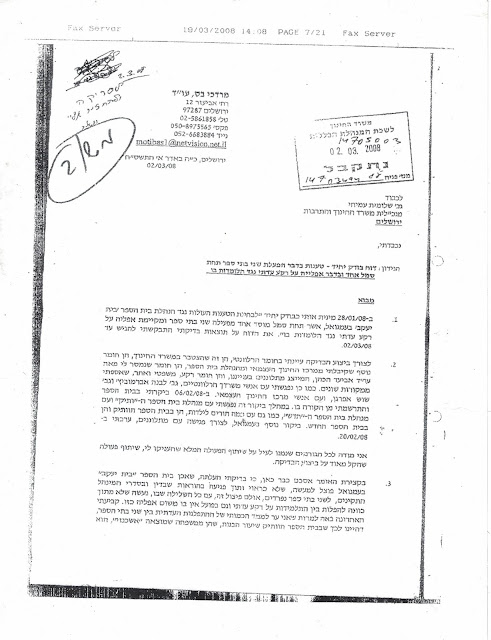School nursing - outbreaks do not come from nowhere
The degradation of community health nursing in Israel reflects the following:
1 - the nurse used to be present daily, then, she was present weekly. Even a once a week presence can be enough to build some rapport and trust with students and their families, and able to :
a - educate regarding the importance of vaccines
b - track side effects to vaccines.
2 - the signature on the health declaration, which includes a clause for vaccine allowance, is simply not working with parents. After almost a decade in implementing this policy, parents expect to give final approval for the vaccines at the time of administration, not via a signature on a form in the summer before the school year begins. This policy does not work. Parents have been angered that their child was vaccinated based only on this signature, yet, the management that oversees school nursing insists on this policy, one that surely breaks trust.
3 - heights and weights used to be performed in the first, third, fifth and seventh grades. Since about 2005, they are only performed in the first and seventh grades. Seventh grade is very late, if there is a weight problem, or if the child is below the minimum height, it can be months before he or she can see an endocrinologist and get treatment. School nurses have been saying this to management for years, nothing changed. At one large gathering which a member of the ministry of health attended, I raised my hand and declared that we perform growth evaluations in earlier grades, perhaps instead of the seventh grade, and she responded with a curt, "I heard you." There is no feedback mechanism, despite the nursing literature's call for "evidence based practice".
4. Haredi communities do not have television or internet, and have less access to information, thus the haredi nurse who has built rapport with her haredi neighbors is likely to be a valuable asset - this was completely ignored by management.
The nursing literature and common sense attest that the presence of trusted community health workers increases patient trust and compliance. In Israel, the community health nurse used to work both in "tipat chalav", which is maternal child care, and the schools on a regular basis, perhaps she was present daily, or even once a week in a few schools, and thus knew families from pregnancy, infant to toddlerhood, through the school years. She was thus able to build trust.
For over two decades, the role of the community health nurse has decreased.
The first lessening of services - the nurse that worked in "tipat chalav" was removed from schools and relegated only to the tipat chalav, thus, only being acquainted with families through pregnancy until kindergarten, then, the school nurse served the first through ninth graders. Here was a disruption of services.
When I became school nurse in 2001, I was present once a week in a school, seeing the students on a weekly basis.
Then, in about 2005, I was assigned nine schools, so was not present weekly, by the time I left, in 2023, I was responsible for 16 schools, plus I was sent to many other schools to assist the other nurses.
I joke that I went from being a school nurse to a traveling nurse, to "nurse checkmark", that is, call the parents once a year and check that you phoned them and then blame them for outbreaks,
And here is where we find why racism is so useful - groomed to dislike haredim, the Israeli public can easily write off outbreaks in haredi communities as their own fault, while Israelis watch minute by minute updates about the latest war, turning a blind eye to the lessening of social services, already groomed to dislike certain sub-populations.
Watch a few clips of the movie "Stand and Deliver", in which a high school teacher teaches calculus to Hispanic inner city students, and you will see what I mean.
https://www.youtube.com/watch?v=eU4-wIieuWU&list=PLZbXA4lyCtqqYU7gW8Vw4iYRJEvZQF4AG&index=9
You begin to understand why certain prejudicial attitudes in Israel are so persistent - its an excuse to deny services, thus, racism serves as a useful economic tool for a few elites.
Now, in Israel, May 2025, there is yet again another outbreak of measles. At the same time, conspiracy theories have been growing regarding not only questioning if vaccines are effective, but even suggesting that they are a form of social control regarding tracking members of the population, or causing infertility.
Might this have something to do with the compartmentalization of nursing?
Who is supposed to be educating the public?
If the school nurse is little known, then how can anyone have trust in what she recommends?




Comments
Post a Comment